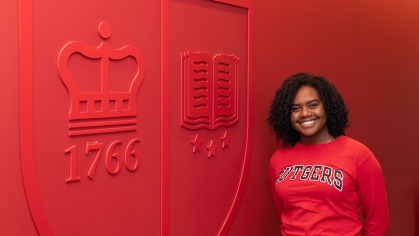Becoming Career Ready
Are You Career Ready?
As you assess who you are and what you have to offer, it’s important to remember that there are several essential skills or “competencies” that most employers find highly desirable. Regardless of your chosen career path, it is crucial you work on developing these competencies so you can demonstrate to employers that you are a high-quality, career-ready candidate, prepared to handle a variety of tasks and contribute positively to the workforce.
The National Association of Colleges and Employers (NACE) has developed eight career readiness competencies highly valued by employers. NACE defines career readiness as “a foundation from which to demonstrate requisite core competencies that broadly prepare the college-educated for success in the workplace and lifelong career management.”
- Career & Self-Development
- Communication
- Critical Thinking
- Equity and Inclusion
- Leadership
- Professionalism
- Teamwork
- Technology
Great news! You can develop these competencies right here at Rutgers, by actively participating in the classroom and by getting involved beyond the classroom (e.g., activities, leadership, research, part-time jobs, internships, etc.).
Employers won’t just take your word for it that you have these competencies – you need to be able to articulate the meaning behind your experiences, skill development, and growth. Your ability to communicate transferable skills and demonstrated competencies on your resume, in an interview, and while networking is vital to your success.
Any experience can lead to transferable skills and growth if you take the time to make meaning of it. One of the best ways to communicate your skills is through stories or examples that demonstrate how you developed or applied those competencies and what you accomplished as a result. If you strategically develop these skills and practice how you will communicate them to others, you will be more than career-ready by the time you graduate!
The opportunities highlighted below are just some of the ways you can develop your skillset, and many of them will help you exercise multiple competencies!
Career & Self-Development
"Identify, advance, and articulate one's skills, strengths, knowledge, and experiences relevant to the position desired. Identify career goals and areas necessary for personal and professional growth. The individual is able to navigate and explore job options, understands and can take the steps necessary to pursue opportunities, and understands how to self-advocate for opportunities in an ever-changing workplace." (NACE)
Ways to develop this competency include:
- Jobs/Work Study/Internship on Campus: Build up your resume by getting transferable work experience through the many on-campus jobs, work-study programs, and internships that Rutgers has to offer!
- Rutgers Internship & Co-Op Course (RICC): Gain credit for an internship, work in an area of interest, and make meaning of the experience.
- Rutgers Scarlet Service Internship (RSSI)
- Rutgers Scarlet Service in Washington (RSSDC)
- Career & Internship Fairs
- Career Resource within CES
- BOLD Center at Douglass: Douglass women navigate their career goals and offers different mentorship opportunities.
- Student Organizations/GetINVOLVED: Discover clubs and student organizations of interest at Rutgers University.
- Self-Assessment Resources: Take the Traitify self-assessment tool to learn how your personality, skills, and strengths translate to a career.
- Research Programs: Apply to Aresty research programs to develop knowledge of university-level research based on topics of interest.
Communication
"Articulate thoughts and ideas clearly and effectively in written and oral forms to persons inside and outside of the organization. The individual has public speaking skills is able to express ideas to others and can write/edit memos, letters, and complex technical reports clearly and effectively.” (NACE)
Ways to develop this competency include:
1. Jobs/Work Study/Internship on Campus: Amplify the voices of Rutgers students through advocating on behalf of the student body, organizing student forums, and allocating fees for student organizations as a member of RUSA.
2. Public Speaking Opportunities: Take advantage of opportunities to demonstrate your ability to communicate effectively to a group or community.
- Toastmasters
- Mark Conference
- Public Speaking Contest
- Public Speaking Course - School of Communication & Information Technology
3. Become a Peer Instructor or a Teaching Assistant: The best way to hone your communication skills is to put yourself to the test consistently. Becoming a Peer Instructor (PI) or a Teaching Assistant (TA) is a great way to do this, as you will be responsible for making sure your fellow peers understand the curriculum you are given to teach. In the First-Year Interest Group Seminars (FIGS) program within Career Exploration and Success (CES), PIs engage their students through thought-provoking discussions, topical area debates, hands-on experiments, and lessons about college success while simultaneously enhancing their own leadership skills, public speaking abilities, and teaching techniques.
Critical Thinking
"Exercise sound reasoning to analyze issues, make decisions and overcome problems. The individual is able to obtain, interpret, and use knowledge, facts, and data in this process, and may demonstrate originality and inventiveness." (NACE)
Ways to develop this competency include:
1. Research Experience: Conduct research through a program or with faculty or professional staff to explore new questions and demonstrate your ability to think critically and excel beyond your coursework.
- Aresty Research Center
- Cancer Institute
- McNair Scholars
- Collaborative Center for Community-Based Research and Service
2. Resident Assistant: Exercise your verbal and written communication through conflict resolution, time management, and group facilitation in your position as a Resident Assistant.
3. Organization Leader: Take on a position of leadership on your team or in your community to demonstrate change and improve the community’s overall well-being through your impact. Browse getinvolved.rutgers.edu for an organization to join!
4. Classroom Practice: As a student, you are already building critical thinking and problems solving skills that can be applied outside of the classroom. While you continue on your academic journey, think about how these concepts of higher level thinking relate to other settings. Not sure how they do? Reach out to a professor during office hours!
Equity & Inclusion
“Value, respect, and learn from diverse cultures, races, ages, genders, sexual orientations, and religions. The individual demonstrates openness, inclusiveness, sensitivity, and the ability to interact respectfully with all people and understand individuals’ differences. Meet with the office to learn more about scholarships and logistics.” (NACE|)
Ways to develop this competency include:
1. Rutgers Global: What better way to learn about a country than live there through a study abroad program? Explore which option is right for you and get that “life-changing, once-in-a-lifetime, experience.”
2. PeaceCorps: Travel abroad while serving to tackle challenges around the world with Rutgers PeaceCorps! It is a chance to expose yourself to diverse cultures and interact with other volunteers from all different backgrounds. Consider this opportunity while at Rutgers or perhaps after you graduate.
3. Global Brigades: Join an international movement to build economic opportunities around the world by volunteering in another country with Rutgers Global Brigades!
4. HOPE: Visit HOPE (Health, Outreach, Promotion, and Education) to learn how you can improve student health, be respectful and sensitive in your exchanges, and help others do the same!
5. Center for Social Justice Education and LGBT Communities: Check out SJE and the Q-nnected event guide to see how you can get involved in educational and social programs and how to best practice inclusivity.
6. Rutgers Cultural Clubs/Organizations: Consider joining a cultural club or organization that’s right for you! It could be your culture or a different one that’s open to all so you can learn about their practices and understand differences!
7. Rutgers Handshake DEI Signature Events: Specially curated seminars on various DEI topics throughout the academic year.
Leadership
"Leverage the strengths of others to achieve common goals, and use interpersonal skills to coach and develop others. The individual is able to assess and manage his/her emotions and those of others; use empathetic skills to guide and motivate; and organize, prioritize, and delegate work." (NACE)
Ways to develop this competency include:
1. Youth Empowerment Club: Assist with providing educational opportunities and mentorship to the children of the New Brunswick community through the Youth Empowerment Club—from recreational activities to an Oasis Summer Camp.
2. Rutgers Bonner Leaders: Commit to a lifestyle of community service and social justice as part of the Bonner Foundation Network. Volunteer and support non-profit organizations while connecting to like-minded and passionate people.
3. Get Involved: There are hundreds of student organizations on campus for you to join. Consider the different ways you could contribute and ultimately lead through any of those experiences. Check out getinvolved.rutgers.edu for a list of organizations.
4. On-Campus Work and/or Mentorship: Many campus departments also offer employment opportunities that will hone your leadership skills through on-campus jobs and peer mentoring opportunities. Consider being a Career Exploration & Success Intern, a Building Manager for Student Centers or Recreation, an Orientation Leader, Resident Assistant, and more. The opportunities to lead on campus can be found around every corner.
Professionalism
"Demonstrate personal accountability and effective work habits, e.g., punctuality, working productively with others, and time workload management, and understand the impact of non-verbal communication on professional work image. The individual demonstrates integrity and ethical behavior, acts responsibly with the interests of the larger community in mind, and is able to learn from their mistakes.” (NACE)
Ways to develop this competency include:
1. Internships/Job ExperienceThere’s no better way to gain experience in a professional setting than to put yourself in a professional environment through an internship or co-op. Network with professionals in your field and develop meaningful relationships through your experience. There are thousands of positions and opportunities that can be found on Rutgers Handshake! Gain credit along with the internship by enrolling in the Rutgers Internship & Co-Op Course (RICC).
2. Entertainment Productions: Look into these programs for an opportunity to work against a deadline, develop a sense of responsibility, and collaborate with others to produce a stellar performance!
- Livingston Theatre Company
- Cabaret Theatre
- Rutgers University Marching Band
- Any Acapella Group
3. Enactus of Rutgers University: Hone your knowledge of Social Entrepreneurship through this chapter of the global Enactus nonprofit organization. Become involved in one of many project and student leader positions while demonstrating an ability to work with various community partnerships.
Teamwork
“Build collaborative relationships with colleagues and customers representing diverse cultures, races, ages, genders, religions, lifestyles, and viewpoints. The individual is able to work within a team structure, and can negotiate and manage conflict.” (NACE)
Ways to develop this competency include:
1. Recreational Sports:Join one of Rutgers over 50 intramural sports as either a team or an individual player.
2. Rutgers University Programming Association (RUPA): Demonstrate true teamwork and collaboration as part of the university’s largest student programming board, and help build some of the most loved traditions on campus.
3. Student Involvement—Find an Organization: Join a club/organization and learn firsthand the strategies and essentials of working together towards a common goal.
4. Fraternity and Sorority Affairs: Join Greek life – build community, collaborate in the name of a common mission, and experience how teamwork can turn to brotherhood.
5. Rutgers University Dance Marathon: Rutgers students dance, pledge, and volunteer their time to support the Embrace Kids Foundation through the largest student philanthropic event in New Jersey.
Technology
“Leverage existing digital technologies ethically and efficiently to solve problems, complete tasks, and accomplish goals. The individual demonstrates effective adaptability to new and emerging technologies.” (NACE)
Ways to develop this competency include:
1. HackRU: HackRU is a 24-hour hack-a-thon where teams compete to build innovative projects and solve complex problems. Individuals can join or you can sign up as a team.
2. Rutgers Makerspace: Visit this Rutgers Makerspace collaborative workspace (on Livingston campus), designed for students, faculty, and staff from all academic disciplines who love to learn, design, and create.
3. Rutgers Formula Racing: Calling all engineers and race car lovers! This club offers the thrill of competing in annual competitions and the network of practicing engineers and career development.


